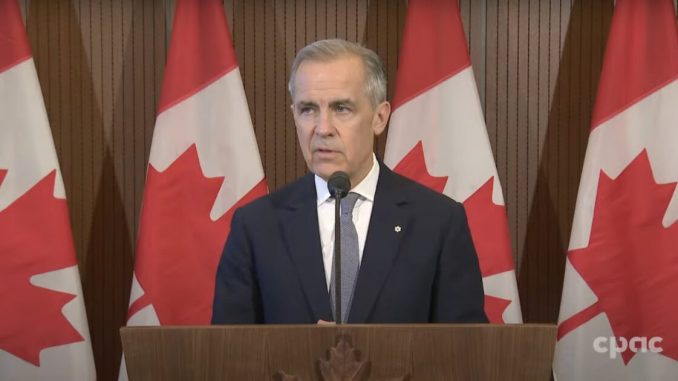
Published November 1, 2025
In a surprising diplomatic twist, Canadian Prime Minister Mark Carney publicly apologized to former U.S. President Donald Trump after a controversial advertisement using the voice of Ronald Reagan to criticize U.S. tariffs sparked outrage in Washington and strained trade relations between the two countries.
The Controversy
The ad, funded by Ontario’s provincial government, featured clips of President Reagan warning against protectionist policies. It was intended to frame tariffs as harmful to trade and consumer prices. However, it was quickly condemned by U.S. officials, who accused Canada of “manipulating Reagan’s words” to attack Trump’s tariff stance.
The backlash was immediate. President Trump reportedly cancelled upcoming trade discussions and temporarily raised tariffs on several Canadian imports by 10%. Facing escalating tensions, Prime Minister Carney took the unusual step of personally apologizing.
“I did apologize to the President,” Carney told reporters after a summit in South Korea. “The advertisement was not approved by my office, and I have spoken with Premier Doug Ford to ensure this does not happen again.”
Trump, speaking to reporters at the White House, confirmed the exchange. “He was very nice. He apologized for what they did in the commercial,” he said, signaling that the matter was resolved but not forgotten.
Reactions and Fallout
The episode drew criticism from both Canadian and American political analysts. Some praised Carney for taking responsibility, noting that his apology may have prevented a deeper rift in North American trade relations. Others argued that it revealed fractures within Canada’s leadership, as provincial initiatives clashed with national diplomatic priorities.
The use of Reagan’s voice added another layer of sensitivity. The Reagan Foundation, which guards the late president’s legacy, reportedly disapproved of the ad’s tone, saying it misrepresented Reagan’s message of cooperation and mutual respect among allies.

Canadian Prime Minister Mark Carney has apologised to Donald Trump over an anti-tariff TV advert using remarks once made by former US President Ronald Reagan

On Friday, Mr Trump said he had accepted Mr Carney’s apology

Trump set a 10 percent hike in tariffs on Canada after the ad came out
 Implications
Implications
The Carney–Trump apology incident carries several far-reaching implications beyond the headlines:
1. Diplomatic Sensitivity in Messaging
Canada’s misstep highlights how political messaging can easily cross borders in today’s hyperconnected media environment. What was meant as a domestic commentary on tariffs ended up provoking an international reaction. Governments and communicators alike are reminded that tone and symbolism—especially when invoking icons like Ronald Reagan—carry weight in global diplomacy.
2. The Power of Narrative in Economics
The Reagan-style ad was designed to shape public perception of U.S. tariffs, but it instead reinforced Trump’s position as a strong defender of American trade interests. The backlash demonstrated that messaging in economic debates can shape political legitimacy just as much as policy outcomes.
3. Resetting Canada–U.S. Trade Dynamics
Carney’s swift apology may have prevented a full-blown trade crisis, but it underscores how fragile North American trade relations remain. Tariffs, even symbolic ones, can ripple through key sectors such as steel, agriculture, and automotive manufacturing—affecting thousands of jobs on both sides of the border.
4. Lessons for Media and Public Relations
The fiasco serves as a warning for political strategists and advertisers: authenticity and context matter. Manipulated or decontextualized media—especially involving revered historical figures—can backfire, causing reputational and economic damage faster than it can deliver any political gain.
5. Broader Economic Signal
Markets pay attention to more than tariffs—they watch tone. Carney’s apology sent a stabilizing signal to investors and trading partners that Canada values cooperation with the U.S., reaffirming that economic diplomacy is as much about perception as policy.
 Overall Takeaway:
Overall Takeaway:
The controversy surrounding the Reagan-themed anti-tariff ad and Prime Minister Mark Carney’s subsequent apology to former President Donald Trump underscores how delicate modern diplomacy has become in the age of instant media. A single campaign message, crafted for local audiences, can quickly escalate into an international flashpoint affecting trade, politics, and public perception.
Carney’s apology may have restored short-term goodwill between Canada and the United States, but it also exposed how even trusted allies can stumble when political narratives are mishandled. The episode serves as a reminder that economic messaging—especially when mixed with historical symbolism—must be managed with precision and respect for diplomatic boundaries.
For observers and businesses alike, the lesson is clear: in a globalized world, communication is policy. Words, images, and tone can carry the weight of tariffs, influencing both markets and international relations far beyond their intended reach.
SOURCES: THE GATEWAY PUNDIT – Canadian PM Mark Carney Apologizes to Trump Over Manipulated Reagan Tariff Ad
FOX BUSINESS – Trump gets apology from Canadian PM after anti-tariff Reagan ad backfires
DAILYMAIL ONLINE – Canada Prime Minister Mark Carney APOLOGISES to Donald Trump over TV ad row after infuriated President hiked tariffs and ended trade talks





Be the first to comment